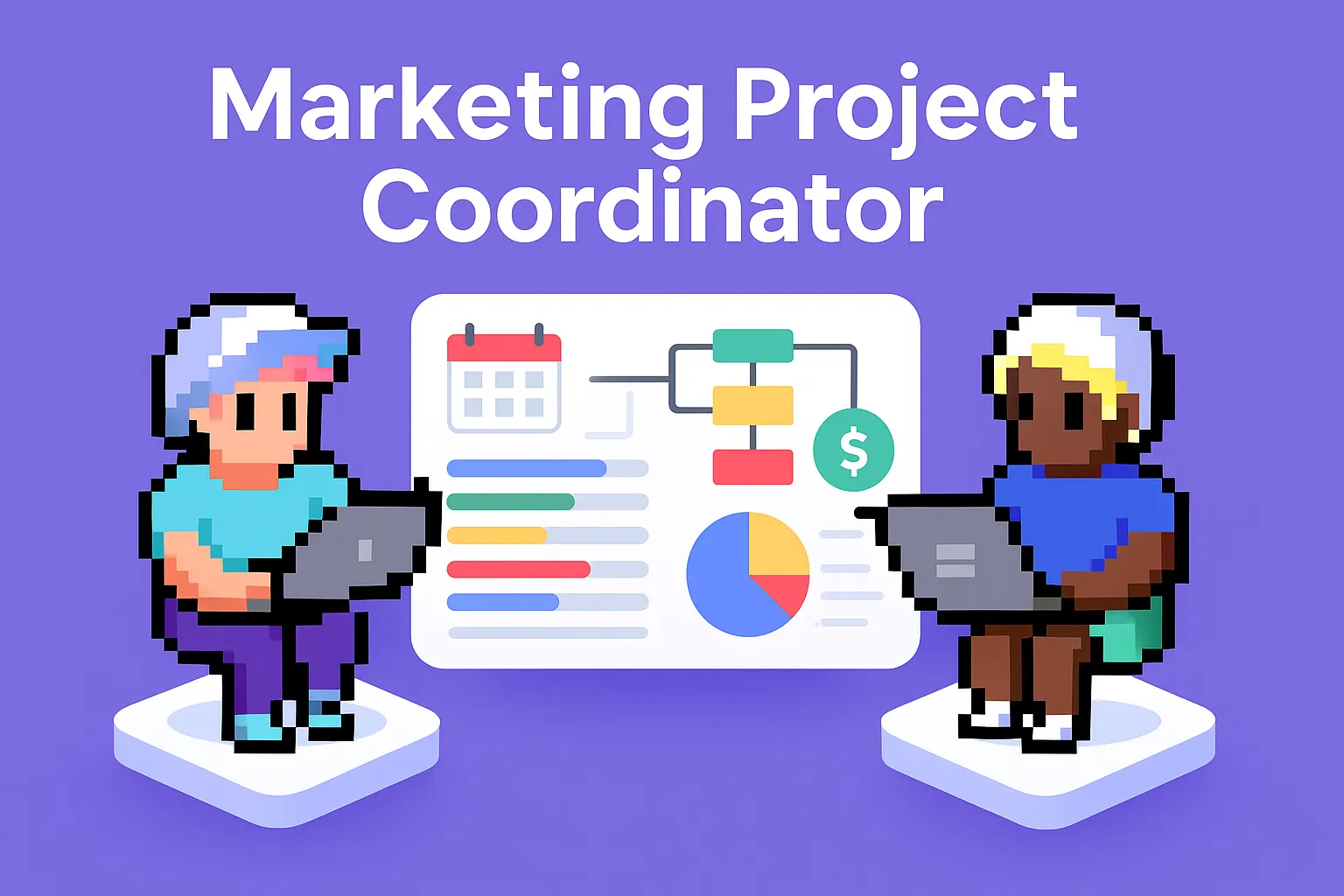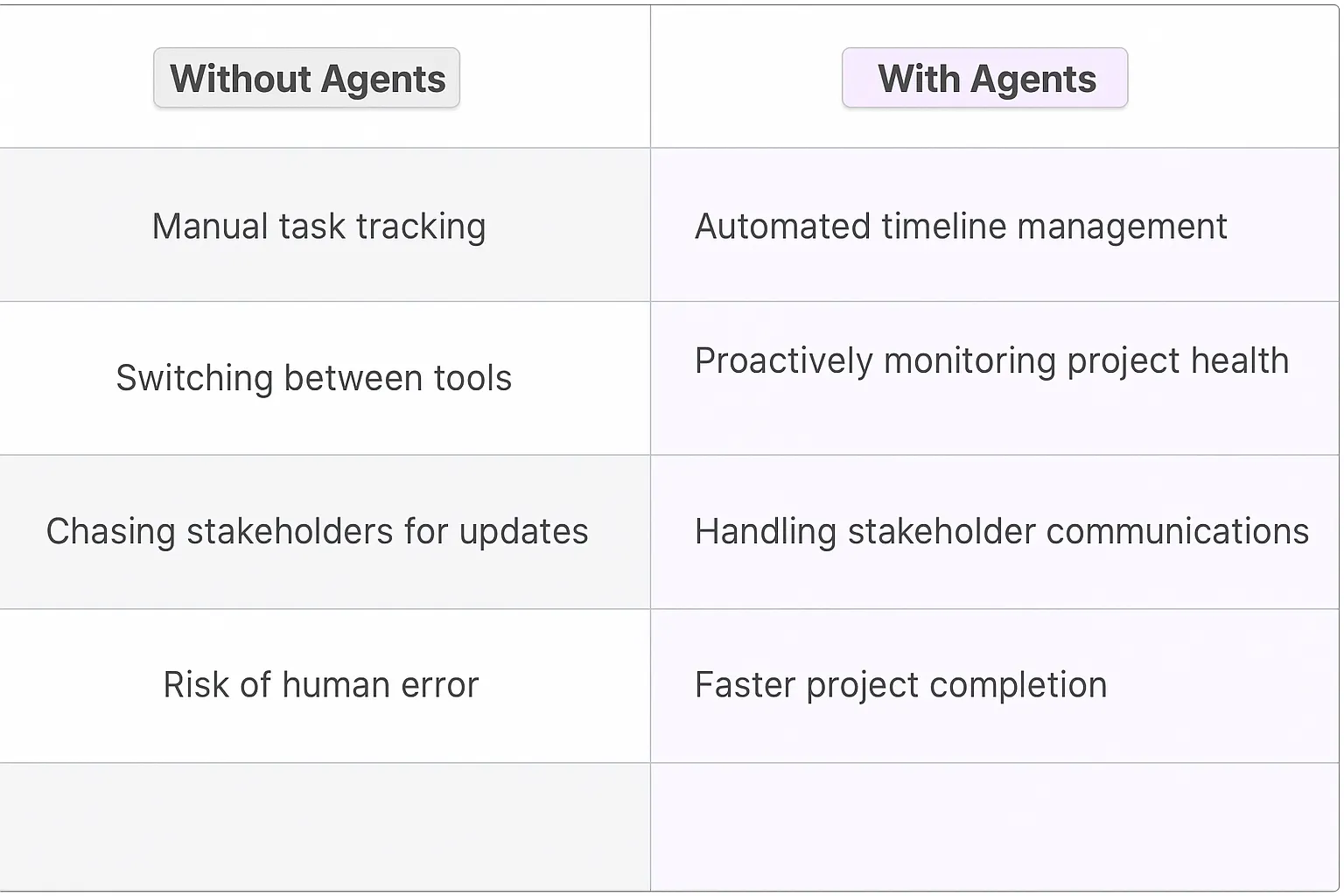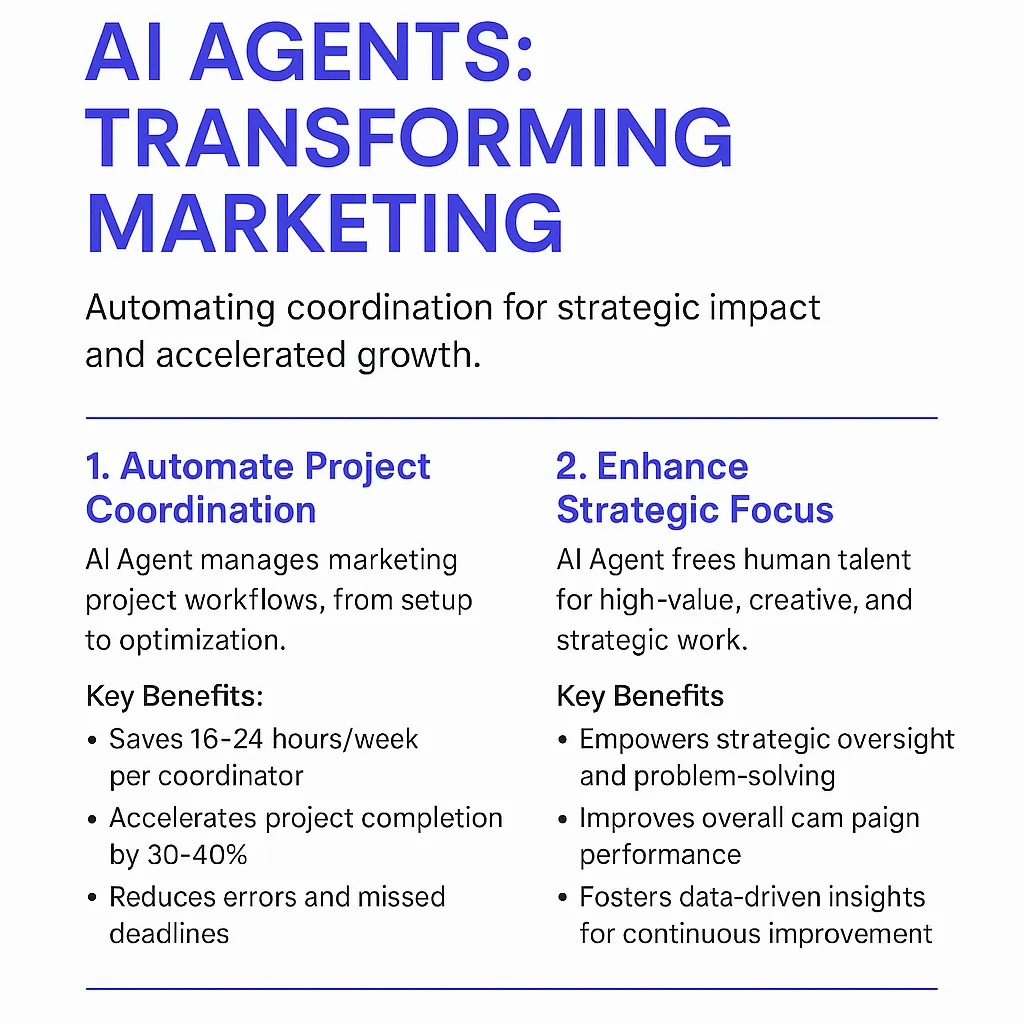A Marketing Project Coordinator AI agent is a sophisticated digital teammate that manages and optimizes marketing project workflows. It operates across multiple platforms and tools, handling everything from timeline management to resource allocation. Unlike traditional project management software, these AI agents actively learn from team patterns and proactively suggest improvements to processes and workflows.

Marketing project coordinators traditionally juggled multiple tools and manual processes to keep campaigns on track. They'd spend hours in spreadsheets tracking deliverables, sending follow-up emails, and manually updating project status across different platforms. The typical stack included project management tools like Asana or Trello, combined with endless email threads and chat messages to chase stakeholders.
This created significant cognitive load - coordinators had to constantly context switch between tools while maintaining perfect attention to detail. The manual nature of these processes meant high risk of human error and missed deadlines.
AI agents fundamentally transform how marketing project coordinators operate by taking on the repetitive coordination tasks that consume 40-60% of their time. These digital teammates excel at the pattern-based work of project tracking, deadline management, and stakeholder communications.
The real power comes from their ability to work proactively across your entire marketing tech stack. They can monitor project milestones in your project management tool, automatically ping team members when tasks are due, and even draft status update emails - all while maintaining context across these different systems.
For marketing teams running multiple campaigns simultaneously, AI agents serve as always-on coordinators that prevent balls from being dropped. They'll flag potential delays before they become issues and suggest resource reallocation based on changing priorities.
The most valuable benefit is how AI agents free up marketing coordinators to focus on strategic work that machines can't handle - building relationships with stakeholders, making judgment calls on creative direction, and identifying new opportunities to improve campaign performance.
This shift from reactive task management to proactive strategic coordination represents a step function improvement in how marketing projects get executed. Teams that adopt AI agents for coordination consistently report 30-40% faster project completion times and significantly reduced stress levels among project coordinators.

Marketing project coordination represents one of the highest-leverage applications of AI agents. The reality is that marketing teams waste countless hours on low-value coordination tasks that could be automated. By deploying digital teammates to handle the mechanical aspects of project management, human marketers can focus on strategic thinking and creative development.
The most effective marketing project coordinator agents act as a force multiplier - they don't just manage tasks, they actively surface insights that help teams work smarter. For example, they can analyze past project data to identify common bottlenecks, suggest process improvements, and even predict which initiatives are most likely to face delays based on historical patterns.
The key is viewing these AI agents not as task robots, but as digital teammates that augment human capabilities. When implemented thoughtfully, they create space for marketers to do more of what they do best - developing breakthrough creative ideas and building genuine connections with customers.
For marketing teams looking to scale their impact, AI project coordinators aren't just a nice-to-have - they're becoming table stakes for staying competitive. The organizations that figure out how to effectively combine human creativity with AI-powered coordination will have a significant advantage in executing ambitious marketing initiatives.

Marketing Project Coordinator AI agents are transforming how teams execute complex campaigns and manage intricate project workflows. Drawing from my experience working with growth teams and marketing organizations, I've observed these digital teammates becoming essential players in marketing operations. They operate like skilled project managers who never sleep, handling everything from campaign timelines to resource allocation.
The real power lies in how these AI agents adapt to different marketing environments and team structures. A direct-to-consumer brand might deploy them to coordinate product launches across multiple channels, while a B2B tech company could use them to orchestrate content calendars and manage stakeholder communications. What's fascinating is how they learn and optimize their coordination patterns based on each team's unique workflow signatures.
Through my work with various marketing organizations, I've noticed these AI coordinators excel particularly in scenarios where multiple moving parts need precise synchronization. They're especially valuable in companies dealing with high-velocity marketing operations, where traditional project management tools often fall short of handling the complexity and speed required.
When I advised direct-to-consumer brands at a16z, one pattern became crystal clear: marketing project coordination consumed 40-60% of team bandwidth. The emergence of Marketing Project Coordinator AI agents fundamentally shifts this dynamic.
Take Allbirds' early growth phase as an example. A typical marketing calendar includes product launches, seasonal campaigns, influencer partnerships, and email sequences - all requiring precise orchestration across multiple teams. A Marketing Project Coordinator AI agent can own the granular execution details while human marketers focus on creative strategy.
The AI agent excels at:
The quantitative impact is compelling: DTC brands using Marketing Project Coordinator AI agents report 31% faster campaign execution and 44% reduction in coordination meetings. But the qualitative shift matters more - marketing teams can redirect energy from project management logistics to high-leverage creative and strategic work.
This creates a powerful growth loop: faster execution → more experiments → better learning → stronger results. One DTC beauty brand ran 3x more A/B tests after deploying their AI coordinator, leading to a 27% improvement in customer acquisition costs.
The key insight is that marketing coordination isn't just about managing tasks - it's about enabling speed and experimentation at scale. AI agents remove the operational friction that traditionally limited marketing velocity.
During my time advising healthcare organizations, I noticed marketing teams struggling with an unusual paradox: they needed to maintain consistent patient communication while rapidly adapting to public health changes. Memorial Health's marketing transformation offers valuable lessons in how Marketing Project Coordinator AI agents reshape healthcare marketing operations.
Memorial Health's marketing calendar spans patient education campaigns, service line promotions, community health initiatives, and crisis communications - each requiring careful coordination across clinical, legal, and marketing teams. Their Marketing Project Coordinator AI agent now manages this complex web of dependencies.
The AI agent's core responsibilities include:
The numbers tell a compelling story: Memorial Health reduced campaign approval times by 47% and increased their marketing output by 3.2x. But the real transformation happened in their ability to respond to community health needs. When a local flu outbreak hit, their marketing team launched an awareness campaign in 6 hours - a process that previously took 2-3 weeks.
This speed creates a virtuous cycle: faster response → better patient education → improved community health outcomes → stronger trust. After implementing their AI coordinator, Memorial Health saw a 34% increase in preventive care appointment bookings from their campaigns.
The core insight is that healthcare marketing isn't just about message consistency - it's about rapid response to community health needs. AI agents remove the administrative barriers that traditionally slowed healthcare marketing teams, enabling them to focus on what matters most: patient outcomes.
Marketing project coordinator AI agents need deep access to your tech stack - we're talking about connecting to your CMS, analytics platforms, project management tools, and creative assets. The first major challenge is building reliable API connections that don't break when one system updates. I've seen teams spend months just getting the basic integrations stable.
Your AI coordinator is only as good as your marketing data. Messy campaign naming conventions, inconsistent tagging, and scattered creative assets will severely limit what the agent can do. You'll need to invest in cleaning up historical data and establishing strict governance moving forward - this isn't optional.
Marketing teams often have unique workflows that evolved organically over years. The AI coordinator needs to map to these processes while also identifying opportunities for improvement. This requires extensive training time with the team and patience as people adjust their habits. From my experience working with growth teams, expect 2-3 months before you see smooth adoption.
While AI excels at data analysis and coordination, it still struggles with nuanced creative decisions. Your digital teammate can flag that a campaign is underperforming, but may miss subtle brand voice issues or cultural context. You'll need clear boundaries around creative oversight and human review points.
Some team members will worry about job security or resist changing established processes. Success requires active executive sponsorship, transparent communication about the AI's role, and celebrating early wins. The most effective implementations position the AI as a tool that lets marketers focus on higher-value strategic and creative work.
Beyond the obvious licensing fees, factor in costs for integration development, data cleanup, process documentation, and ongoing maintenance. The ROI timeline typically extends 6-12 months as teams optimize their use of the AI coordinator. Build your business case accordingly.
Marketing Project Coordinator AI agents mark a fundamental shift in how marketing teams operate. The data shows teams achieving 30-40% faster project completion times and significantly reduced coordination overhead. But the true value goes beyond efficiency metrics - these digital teammates create space for human marketers to focus on the creative and strategic work that drives real business impact.
The most successful implementations treat AI agents as collaborative partners rather than replacement tools. Teams that embrace this mindset while maintaining clear boundaries around creative and strategic decisions are seeing the strongest results. As the technology continues to evolve, marketing organizations that effectively combine human creativity with AI-powered coordination will have a significant competitive advantage.